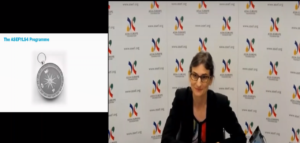Tuesday, February 23, 2021 marked the beginning of another chapter of the 4th Asia-Europe Foundation’s Young Leaders Summit (ASEFYLS4). Unlike the previous ASEFYLS where participants from around the world gathered in one host country, the 4th edition is conducted online due to the global pandemic, which affected every part of the world. Nevertheless, it did not decrease the value of the programme. On the contrary, adopting to the circumstances, ASEF created a compact programme, with equally intense and inclusive learning opportunities. For the next ten months, 202 participants and facilitators from 51 countries will be discussing issues related to the Sustainable Development Goals (SDGs) in the post-COVID-19 era.



In his closing statement, HE Morikawa is expecting several outcomes of the journey. First, he hopes that youth will grow through peer-to-peer training, learning & cooperation and engage in Intergenerational Leadership Dialogues to debate solutions and visions for “Sustainable Development in a post-COVID-19 World” in the context of social & political realities. Second, he asked the youth to walk the talk (execute the ideas of the discussions to action) and demonstrate their commitment to “Sustainable Development in a post-COVID-19 World” through concrete “Leadership in Action” activities in local communities across ASEM and the virtual space. Lastly, he reminded the participants that their thoughts and perspectives on “Sustainable Development in a post-COVID-19 World” will be captured in the ASEFYLS 4 Youth Declaration, to be handed over by four youth representatives to the ASEM Leaders at the ASEM 13 Summit Opening Ceremony.
Following, HE Soken Sok, Secretary of State, Ministry of Foreign Affairs and International Cooperation (MFAIC) of Cambodia, was introduced. As a representative from Cambodia, the host country of the 13th Asia-Europe Meeting and ASEFYLS4, HE Sok felt honoured to welcome young talented people from around the world to this 10-month long programme. In his welcoming remarks, HE Sok highlighted the importance of collective and coordinated transformation at all levels of society to achieve the 17 SDGs. He explained that the programme would facilitate participants involvement not only in peer-to-peer learning about the issue that piqued their interest, but also to take part in making a real impact through one of the 15 projects, which seek improve the areas of Health & Wellbeing, Quality Education, Decent Work & Economic Growth, and Climate Action. With the rise of populism across the world, youth is vulnerable to political polarisation and radical indoctrination without actually being given the chance to be involved in institutional mechanisms that help solve problems on the ground. This leadership programme will provide a unique opportunity to demonstrate the participants knowledge, problem-solving skills, and a chance to kick-start their leadership campaign and hopefully in the future, they can contribute more to policy making and implementation at both the global and local levels.

To end his remarks, HE Sok brought forward an interesting aspect on the importance of intergenerational collaboration between present policy makers and young change-makers at both the national and the international level to ensure sustained progress towards the 2030 Agenda.
The event continued with Ms Nagarajan showing the participants a picture of a compass and asking them what was wrong with it. Participants quickly noticed that there is no needle, which is normally found on a fully functioning compass.

Ms Nagarajan hopes that the ASEFYLS4 programme will provide a sense of direction to the participants, not only towards the SDGs, but also towards leadership. To realise the idea of giving young people a sense of direction, ASEF’s learning programme has been divided into three phases–these are knowledge building, youth summit, and leadership in action.
In the Knowledge Building Phase (February – May 2021), participants will enhance their knowledge on the four main SDGs, namely Good Health and Well-Being, Quality Education, Decent Work and Economic Growth, and Climate Action. During this phase, ASEF collaborates with the College of Europe in Natolin (CoEN) in developing thematic courses on the four development goals. There will be assignments for the participants to complete after the discussion of each Global Goal, with a focus on key personalities from UN agencies. These individual and group assignments allow the participants to interact, collaborate, and share their ideas on SDGs and connecting issues with their peers. Apart from thematic courses, ASEF will also facilitate a leadership training in collaboration with the Center for Creative Leadership (CCL) for the participants. Likewise, CCL will assign individual and group projects and reflection sessions on how to become an effective leader in a society and working group.
After the Knowledge Building Phase and dependent on the development of the pandemic, ASEF will hold a hybrid ASEFYLS4 summit for 3 to 4 days in Cambodia. Initially, the meeting would have been conducted in June 2021, but for health and safety reasons, it was postponed to November 2021. The summit allows the participants to play an active role in facilitating meetings and have dialogues with policy makers and key figures in politics from Asian and European regions.
The last phase of the 10-month learning programme is Leadership in Action (June – November 2021). For this phase, participants are divided into 15 groups, working on different projects related to the SDGs. Each group has a Navigator, who acts as a project leader of the group and has been trained in the ASEFYLS4 Navigator Training prior to the programme. This phase intends to provide the young change makers with the opportunity to showcase their leadership and knowledge on development-related project implementation in real societies.
A Q&A session marked the end of the session, and at the same time, opened a new chapter of the 4th edition of ASEFYLS and the 10-month learning programme.

(Participants in ASEFYLS4 Leaders Photo Session)



